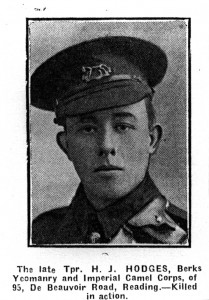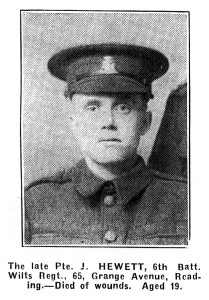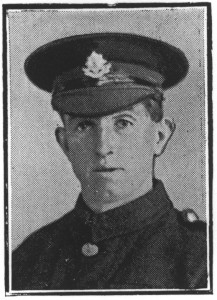Horace John Hodges
Trooper 50109
Berkshire Yeomanry and Imperial Camel Corps
 |
Horace John Hodges was the son of John Henry and Alice Mary Hodges 95 De Beauvoir Road. He joined the Berkshire Yeomanry in 1912 and was killed in action on 1st May 1918 aged 23. In spite of the intimation that his body had been found he had no known grave and is commemorated on the Jerusalem Memorial panel 7.
An article, reproduced below, was published in the Reading Chronicle 26th June 1918.
Signaller’s Death
Mr Hodges of 95, De Beauvoir road, Reading, has received the sad intelligence that his son Horace, who was a signaller, was killed in action on the banks of the Jordan on May 1st. His Lieutenant writes that owing to the corps having to yield ground at the time the deceased was left where he fell with three or four others but on going over the ground again that night graves were found, the deceased no doubt being one of them. The lieutenant added “he and all the boys had done well that morning, carrying out their duties and disregarding personal danger. Signaller J. T. Rhodes, a Reading lad, who was formerly under Mr. W. J. Hodges in the Spring Gardens Band, writes: ”We were called out at midnight and had to march all night. We had to advance over the hills. When we got in close contact with the enemy it was awful – absolutely raining bullets. Poor Horace laid down and only fired one shot before he was hit, a bullet penetrating his heart. His loss is deeply regretted by all his friends.” Signaller Hodges joined the Berkshire Yeomanry six years ago, when he was 17 years of age, and arrived in Egypt with the first contingent on April 22nd 1915, the anniversary of his birth. He had been in Egypt continually since that time, not having taken any leave. He did not take part in the Gallipoli* fighting, as he was suffering from poisoning at the time, but he went through the Arab campaign, having been transferred to the Imperial Camel Corps, and has been in much sever fighting since his last letter, which has recently arrived telling of hardships and difficulties of the fighting in the Palestine hills. He was 23.
* When he recovered from his illness he was put in charge of the horses in Cairo.

